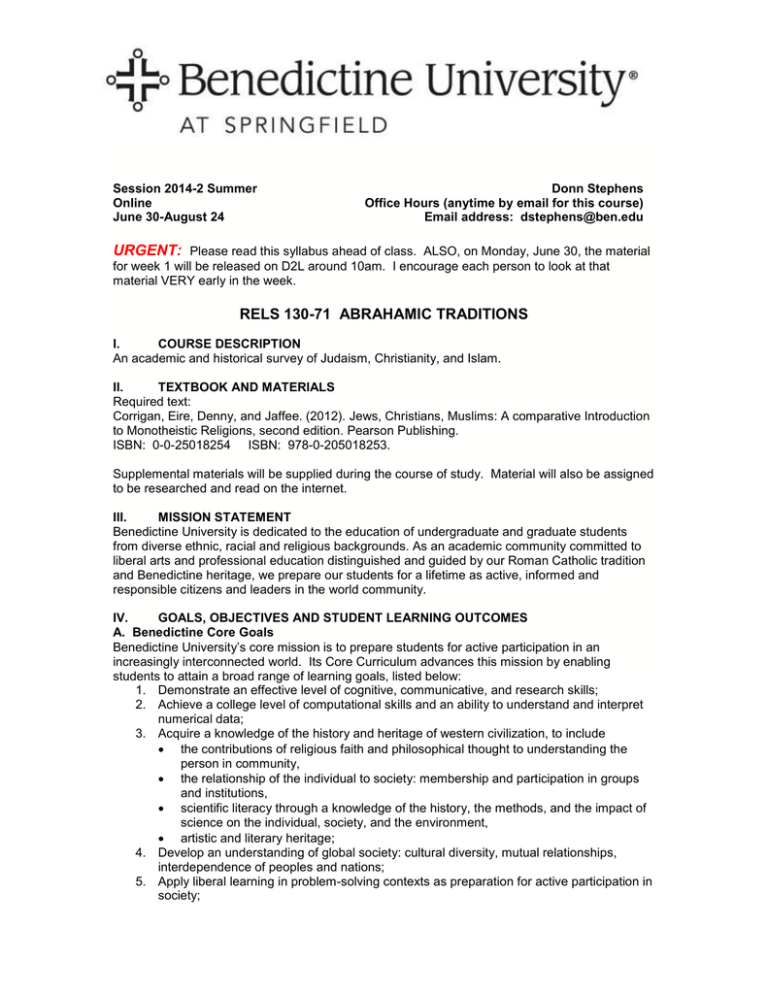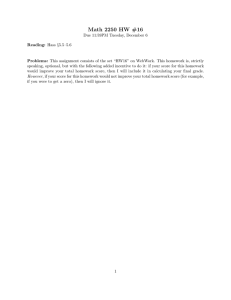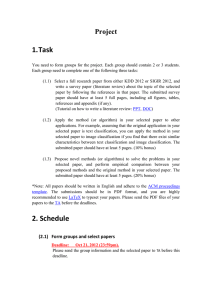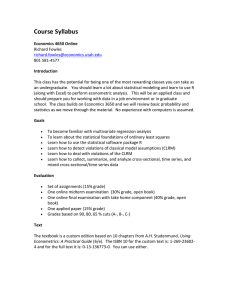Document 17998798
advertisement

Session 2014-2 Summer Online June 30-August 24 Donn Stephens Office Hours (anytime by email for this course) Email address: dstephens@ben.edu URGENT: Please read this syllabus ahead of class. ALSO, on Monday, June 30, the material for week 1 will be released on D2L around 10am. I encourage each person to look at that material VERY early in the week. RELS 130-71 ABRAHAMIC TRADITIONS I. COURSE DESCRIPTION An academic and historical survey of Judaism, Christianity, and Islam. II. TEXTBOOK AND MATERIALS Required text: Corrigan, Eire, Denny, and Jaffee. (2012). Jews, Christians, Muslims: A comparative Introduction to Monotheistic Religions, second edition. Pearson Publishing. ISBN: 0-0-25018254 ISBN: 978-0-205018253. Supplemental materials will be supplied during the course of study. Material will also be assigned to be researched and read on the internet. III. MISSION STATEMENT Benedictine University is dedicated to the education of undergraduate and graduate students from diverse ethnic, racial and religious backgrounds. As an academic community committed to liberal arts and professional education distinguished and guided by our Roman Catholic tradition and Benedictine heritage, we prepare our students for a lifetime as active, informed and responsible citizens and leaders in the world community. IV. GOALS, OBJECTIVES AND STUDENT LEARNING OUTCOMES A. Benedictine Core Goals Benedictine University’s core mission is to prepare students for active participation in an increasingly interconnected world. Its Core Curriculum advances this mission by enabling students to attain a broad range of learning goals, listed below: 1. Demonstrate an effective level of cognitive, communicative, and research skills; 2. Achieve a college level of computational skills and an ability to understand and interpret numerical data; 3. Acquire a knowledge of the history and heritage of western civilization, to include the contributions of religious faith and philosophical thought to understanding the person in community, the relationship of the individual to society: membership and participation in groups and institutions, scientific literacy through a knowledge of the history, the methods, and the impact of science on the individual, society, and the environment, artistic and literary heritage; 4. Develop an understanding of global society: cultural diversity, mutual relationships, interdependence of peoples and nations; 5. Apply liberal learning in problem-solving contexts as preparation for active participation in society; 6. Make informed ethical decisions that promote personal integrity, the legitimate rights and aspirations of individuals and groups, and the common good. B. Course Objectives/outcomes As a distribution course within the Core Electives, RELS 130 was designed with the above Core goals in mind. Thus, upon successful completion of the RELS 130 course, the student will be able to demonstrate their mastery of the following objectives and student learning outcomes: 1. Through discussion, reading, and writing, students will be informed about the history of and contemporary events related to the Western religions of Judaism, Christianity, and Islam; 2. Achieve a level of understanding of the central patterns of belief and practice in these traditions arising out of their history, and be better able to explain differences among the traditions; 3. Be able to listen more critically and read with clarity and understanding reports of happenings in today’s world events concerning these three religions. V. TEACHING METHODS/DELIVERY SYSTEM This course is a combination of lecture (which will be supplied to the student via PowerPoint presentations and printed material in Desire2Learn (D2L)), online course discussions, writing experiences, assignment of reading and research experiences (including internet-based materials), and formal evaluations. VI. COURSE REQUIREMENTS Attendance Policy Since this is an online class, attendance will be “taken” for each student by his/her participation in online discussion forums and by submission of assigned written work (see below). Weekly attendance at each class session is expected and absences and failure to submit work in a timely manner will significantly and negatively impact a student’s grade. Except in extreme situations, all members of the class are expected to participate in a timely manner, keeping current with all assignments. Be prepared to use the Corrigan text for EACH class session. IT IS ENCOURAGED THAT EACH STUDENT BEGIN WORKING ON EACH SESSION EARLY IN THE WEEK, each week !!!!!!!!! Weekly materials will be released on D2L by 10:00am each Monday for the week (in a document called the “map for the week”). SINCE THIS IS AN ONLINE CLASS, IT IS ABSOLUTELY CRITICAL AND EXPECTED THAT EACH STUDENT WILL HAVE CONSISTENT ACCESS TO AND USE OF A COMPUTER THAT HAS INTERNET ACCESS. THERE WILL BE EXPECTATIONS FOR ONLINE DISCUSSIONS FOR THE FIRST PART OF THE WEEK (part A = Mon-Thu) AND OTHERS FOR THE SECOND PART OF THE WEEK (part B = Fri-Sun), AND PARTICIPATION FOR EACH PART OF THE WEEK MUST BE MET DURING THAT PART OF THE WEEK. What that is saying is that students are expected to participate in online discussions during part A AND during part B, not by getting the entire week’s requirements met during A or B alone. This course is highly accelerated, and students will need to take a great deal of responsibility for their own learning outcomes. Attendance is required in each week of class. Any absence must be due to extraordinary circumstances and will require documentation for it to be considered excused. Documentation must be provided immediately in order to determine what, if any, accommodations are reasonable or possible. Attendance and participation will directly impact your final grade, and each undocumented absence will be considered unexcused and will result in a 20% reduction in the final grade for the course. Attendance is critical to being able to stay current with the material being covered. There will be no make-up time allotted for missed exams. Each student is encouraged to anticipate spending 6 hours of work each week on readings and assignments. Professional and substantive discussions will be expected of all students. Some of this participation will be in making initial postings in reply to a weekly prompt, and also in making replies. There will be discussion requirements for the first half of each week, and additional requirements for the second half of the week. Due to the accelerated nature of the course, should you experience a medical condition which prevents you from computer access and use, appropriate medical documentation must be provided immediately so it may be determined what, if any, accommodations are reasonable or possible. Reading Assignments Each student is expected to “come to each class” with assigned material read and digested, and ready to question/discuss (see course outline below). Most students will not find that our textbook is quickly nor lightly read. Each student will find it most helpful to read each chapter at least twice, once carefully and once in a review approach. Written Assignments and Projects Four reflection papers (1-page (300 words) minimum, double-spaced, acceptable font and pitch, indented paragraphs, no extra spacing between paragraphs) will be required. Writing guidelines for the papers will be noted when each paper/topic is assigned. While each paper is primarily an exposition of the student’s reflection on the assigned topic, it should also demonstrate the student’s having read and grasped the material. Each paper should exhibit university level work, and anything less (spelling, sentence structure, format, etc) will seriously reduce that paper’s grade. There will be a specific format in which these papers will need to be written in order for the papers to be accepted. All of this will be discussed more fully in class. See outline below for approximate dates on these papers. All written work will be submitted through D2L, and will be checked for plagiarism. Late work 1. All assigned work and tests are due by the assigned date and time, without exception. 2. No tardy work will be accepted, no matter the reason. 3. In case of emergency and make-up work, no work will be accepted more than one week after due date, and no work will be accepted after the end of week 8. Benedictine University at Springfield Student Academic Honesty Policy The search for truth and the dissemination of knowledge are the central missions of a university. Benedictine University at Springfield pursues these missions in an environment guided by our Roman Catholic tradition and our Benedictine heritage. Integrity and honesty are therefore expected of all University students. Actions such as cheating, plagiarism, collusion, fabrication, forgery, falsification, destruction, multiple submission, solicitation, and misrepresentation are violations of these expectations and constitute unacceptable behavior in the University community. Student’s Responsibility Though there is no formal honor code at Benedictine University at Springfield, students are expected to exhibit academic honesty at all times. Violations against academic honesty are always serious and may result in sanctions that could have profound long-term effects. The final responsibility for understanding the Academic Honesty Policy of the institution, as well as the specific policies for individual courses normally found in syllabi, rests with students. If any doubt exists about what constitutes academic dishonesty, students have the responsibility to talk to the faculty member. Students should expect the members of their class to be academically honest. If students believe one or more members of the class have been deceitful to gain academic advantage in the class, students should feel comfortable to approach the faculty member of the course without prejudice. Violations of the Academic Honesty Policy will be reported to the Office of the Dean of Academic Affairs. Along with a verbal warning, the following are consequences a student may face for academic dishonesty: a failing grade or “zero” for the assignment; dismissal from and a failing grade for the course; or dismissal from the Institution. VII. MEANS OF EVALUATION The final grade for the course will be based on: Assigned written work (35%) Class participation and online discussions (30%) Online exams (in D2L) (35%). Grade specifics will be discussed during the first week of class. Grades will be posted in D2L on Monday morning of each week. Grading scale: A 90-100%; B 80-89%; C 70-79%; D 60-69%; F 0-59% (please note that “F” is the lowest grade, not “E”, and that there are no +/- grades) Grade Appeal Process If a student believes that an error has been made in reporting a grade, an appeal must be made in writing to the instructor and must be initiated within 60 calendar days after the end of the term for which the grade in question was reported. The appeal should contain specific information about why it is believed the grade reported is inaccurate. See the Student Handbook for details. Add/Drop Dates Please refer to the current Academic Calendar for add/drop dates. Incomplete Request To qualify for an “I” grade, a minimum of 75% of the course work must be completed with a passing grade, and a student must submit a completed Request for an Incomplete form to the Registrar’s Office. The form must be completed by both the student and the instructor. It is the student’s responsibility (not the instructor’s) to initiate this process and obtain the necessary signatures. Student Withdrawal Procedure It is the student’s responsibility to officially withdraw from a course by completing the appropriate form, with appropriate signatures, and returning the completed form to the Advising Office. Please refer to the Student Handbook for important financial information related to withdrawals. VIII. TOPICAL COURSE OUTLINE Week 1 (June 30-July 6) Review of syllabus, ground rules for the class, and plagiarism Explanation of how the course will operate and instructions for each student on how to work through the course Introduction and historical roots of each tradition—exploring the Preface of the Corrigan text Other reading materials will be provided Investigation of websites giving background information on each tradition Acclimation exercises/assignments for D2L due by 11:59pm July 3 Online discussion participation A due by 11:59pm July 3, participation B due between midnight July 3 and 11:59pm July 6 Assignment: Reflection Paper #1 (topic to be given) due by 11:59pm July 6. “Minute write” (student assessment of this week’s material) Week 2 (July 7-13) In Corrigan, investigate Part I, “Scripture and tradition” “Minute write” Assignment: no writing assignment this week Online discussion participation A due by 11:59pm July 10, participation B due between midnight July 10 and 11:59pm July 13 Week 3 (July 14-20) In Corrigan, investigate Part II, “Monotheism” “Minute write” Assignment: Reflection Paper #2 due by 11:59pm July 20. Online discussion participation A due by 11:59pm July 17, participation B due between midnight July17 and 11:59pm July 20 Week 4 (July 21-27) In Corrigan, investigate Part III, “Authority” “Minute write” Assignment: no writing assignment this week Online discussion participation A due by 11:59pm July 24, participation B due between midnight July 24 and 11:59pm July 27 Mid-term exam online due 11:59pm July 27 Week 5 (July 28-Aug 3) In Corrigan, investigate Part IV, “Worship and ritual” “Minute write” Assignment: Reflection Paper #3 due by 11:59pm Aug 3 Online discussion participation A due by 11:59pm July 31, participation B due between midnight July 31 and 11:59pm Aug 3 Week 6 (Aug 4-10) In Corrigan, investigate Part V, “Ethics” “Minute write” Assignment: there is no writing assignment this week Online discussion participation A due by 11:59 Aug 7, participation B due between midnight Aug 7 and 11:59pm Aug 10 Week 7 (Aug 11-17) In Corrigan, investigate Part VI, “Material culture” “Minute write” Assignment: Reflection Paper #4 due by 11:59pm August 17 Online discussion participation A due by 11:59pm Aug 14, participation B due between midnight Aug 14 and 11:59pm Aug 17 Week 8 (Aug 18-24) In Corrigan investigate Part VII, “Religion and the political order” “Minute write” Assignment: there is no writing assignment this week Online discussion participation A due by 11:59pm Aug 21, participation B due between midnight Aug 21 and 11:59pm Aug 24 Final exam online due 11:59pm Aug 24 Everything for the course due by 11:59pm Aug 24 IX. AMERICANS WITH DISABILITIES ACT (ADA) Benedictine University at Springfield provides individuals with disabilities reasonable accommodations to participate in educational programs, activities, and services. Students with disabilities requiring accommodations to participate in campus-sponsored programs, activities, and services, or to meet course requirements, should contact the Resource Center as early as possible: springaccess@ben.edu or (217) 525-1420, ext. 3306. X. ASSESSMENT Goals, objectives, and learning outcomes that will be assessed in the class are stated in this syllabus.. Instructor will use background knowledge probes, one-minute papers, reflective essays and/or other Classroom Assessment Techniques as deemed necessary in order to provide continuous improvement of instruction.


